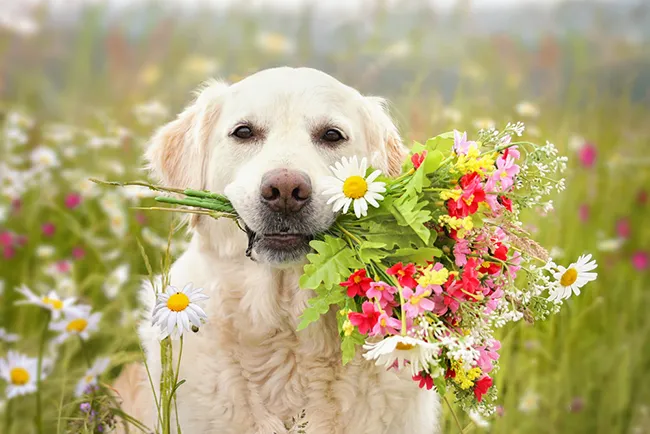
In the harmonious blend of nature and companionship, the relationship between flowers and dogs holds a unique charm and importance. While flowers add beauty and tranquility to our lives, dogs bring companionship and joy. However, maintaining this coexistence in our gardens and homes requires careful consideration, as some flowers can be harmful to our furry friends. And for those who wish to celebrate the beauty of blooms while ensuring the safety of their canine companions, consider the thoughtful choice to order big bouquets of flowers that are pet-friendly, creating an environment where both flowers and dogs can coexist harmoniously.
1. Dog-Friendly Gardens: A Safe Haven
Creating a dog-friendly garden is crucial for pet owners. It involves choosing plants that are safe for dogs and avoiding those that are toxic. Flowers like sunflowers, roses, and snapdragons are safe and add vibrant colors to gardens, while daffodils, tulips, and azaleas should be avoided as they can be harmful if ingested by dogs. Additionally, designing a garden with sturdy plants that can withstand playful dogs is important for maintaining a beautiful and harmonious space.
2. The Therapeutic Bond Between Dogs and Flowers
Interestingly, the presence of flowers can have a therapeutic effect on dogs, much like it does on humans. Studies suggest that the visual stimulation provided by flowers can enhance a dog’s environment, reducing stress and promoting mental wellbeing. Pet owners often report that their dogs enjoy lounging in flower-filled areas, indicating a positive interaction between the two.
3. Training Dogs to Respect Flower Spaces
Training plays a crucial role in balancing the relationship between dogs and flowers. Teaching dogs to avoid flower beds and not to chew on plants is essential for both the safety of the dog and the preservation of the garden. Basic commands like “leave it” or creating designated play areas can help in keeping both the flowers and the dog safe and happy.
4. Allergies and Sensitivities: A Concern for Both
Just as some humans are allergic to certain flowers, dogs too can have allergies. Being aware of a dog’s sensitivities to specific flowers is important. On the flip side, certain flowers can benefit dogs with allergies, as some plants have natural air-purifying qualities, reducing allergens in the environment.
5. The Role of Flowers in Dog-Friendly Home Decor
Incorporating flowers into home decor can be done thoughtfully to ensure it’s safe for dogs. Choosing non-toxic flowers for indoor arrangements, keeping vases out of reach, and opting for artificial flowers can create a pet-safe and aesthetically pleasing environment.
6. Educational Opportunities for Pet Owners
The relationship between flowers and dogs presents an opportunity for pet owners to educate themselves about botany and pet safety. Learning about different plant species, their effects on pets, and how to create a harmonious living space for both plants and animals is an enriching experience for any pet owner.
Conclusion
The coexistence of flowers and dogs in our lives brings a unique set of challenges and joys. By understanding and respecting the needs and safety of our canine companions, we can create beautiful, vibrant spaces that are safe and enjoyable for both. As we cultivate our gardens and decorate our homes, keeping the well-being of our furry friends in mind ensures a harmonious and flourishing environment for all.



